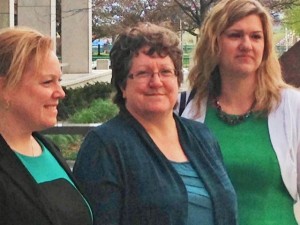MN child care providers declare victory with Harris v. Quinn ruling

By Tom Steward | Watchdog Minnesota Bureau
ST. PAUL, Minn. — Minnesota licensed child-care providers declared victory after a landmark Supreme Court ruling Monday, which comes after nine years spent fending off a union drive while operating their small businesses.
The decision strikes down compulsory “fair share” union dues for Illinois home care workers who care for individuals receiving government subsidies but are not full-fledged state employees.
Thousands of Minnesota small business owners who provide home-based child care for subsidized families were classified as state employees for purposes of collective bargaining under a controversial 2013 state law. But the 8th Circuit Court of Appeals put on hold a statewide American Federation of State, County, Municipal and Employees union drive, pending the outcome of the Harris case.
Monday’s Harris v Quinn ruling appears to set a legal precedent prohibiting public employee unions from charging compulsory fair share fees from child-care providers or personal care assistants in Minnesota and across the country.
“Like Harris v. Quinn, the lawsuit filed here in Minnesota on behalf of myself and 11 other child-care providers is a First Amendment challenge. In fact, the two cases are nearly identical, which leads us to believe the ruling today has set the legal precedent needed to permanently enjoin this unconstitutional child-care union scheme once and for all,” Jennifer Parrish, a Rochester provider and lead plaintiff in the Minnesota case, said in remarks for a Capitol news conference.
“We applaud the ruling and thank the Supreme Court Justices for putting the individual rights of citizens like us over the interests of powerful unions.”
AFSCME officials in Minnesota acknowledged the decision is a setback but noted the high court chose not to address the larger issue of all public employee unions authorized in the 1977 Abood case.
“These employees can’t be required to contribute to unions. This is a substantial obstacle to expanding public employee unions, but it does not gut them. The Court does not overrule Abood,” the union said on the Child Care Providers Together Facebook page.
Minnesota child-care providers linked up on Skype with small business owners fighting union drives in Kansas, Massachusetts, Michigan and Vermont, watching and waiting together for the high court’s decision.
When it came, pandemonium broke out in the St. Paul hotel room where half a dozen Minnesota providers, gathered around their laptops, exchanged hugs and virtual congratulations with providers in other states.
Minnesota providers in September won a temporary injunction from the 8th Circuit U.S. Court of Appeals in their legal challenge to the constitutionality of the Minnesota law. Their attorney, Bill Messenger of the National Right to Work Legal Defense Foundation, also represented Pamela Harris, the successful plaintiff in Monday’s Supreme Court decision.
They called on Minnesota Gov. Mark Dayton to end the state’s attempt to defend the 2013 law. Their case, Parrish v. Dayton, addresses many of the same issues in the Harris case but takes it a step further by challenging the public employees union’s ability to gain exclusive representation for non-state employees. A decision is expected within weeks.
“In light of this ruling, we call on Governor Dayton to immediately halt all legal challenges to our lawsuit. Governor Dayton has maintained the position that because the union has not won an election, no injury has yet occurred and therefore, our case is not ripe for adjudication. We could not disagree more,” said Parrish. “Over the last nine years, the dedicated members of this coalition, who are child-care providers, have collectively spent well over $50,000 out of our own pockets; we’ve sacrificed an immeasurable about of time with our families.”
Dayton’s office was still weighing a response.
AFSCME SETBACK: The union acknowledged today’s ruling will make it difficult to expand the ranks of public employee unions and add more day care providers like these women involved in a similar Minnesota federal court case.
“I haven’t had a chance to talk to the governor yet,” Matt Swenson, press secretary for Dayton, said Monday. “But it’s definitely on our radar today.”
Minnesota GOP groups pounced on the development, viewing it as a potentially potent issue in Dayton’s 2014 re-election bid. The 2013 Child Care Provider Representation Act passed the Minnesota Legislature on a straight party line vote, with all Republicans opposed. Before that, Dayton issued a 2011 executive order authorizing a union drive, which a state court tossed.
“Today’s opinion is a victory for all Minnesotans and will begin the process of rolling back Mark Dayton and the DFL overreach in their attempt to unionize Minnesota small business owners,” said Ben Bolnik, chairman of the Minnesota Jobs Coalition.
One of the founding members of the Coalition of Union Free Providers, Heather Falk, said she left the child-care business partly as a result of the union drive. A plaintiff in the group’s lawsuit, Falk says almost a third of family licensed child-care providers have gone out of business since the union drive began in 2005.
The Supreme Court action apparently applies to the current Service Employees International Union drive to organize 16,000 personal care assistants, believed to be the largest public employee union effort in Minnesota history.
Contact Tom Steward at tsteward@watchdog.org.







